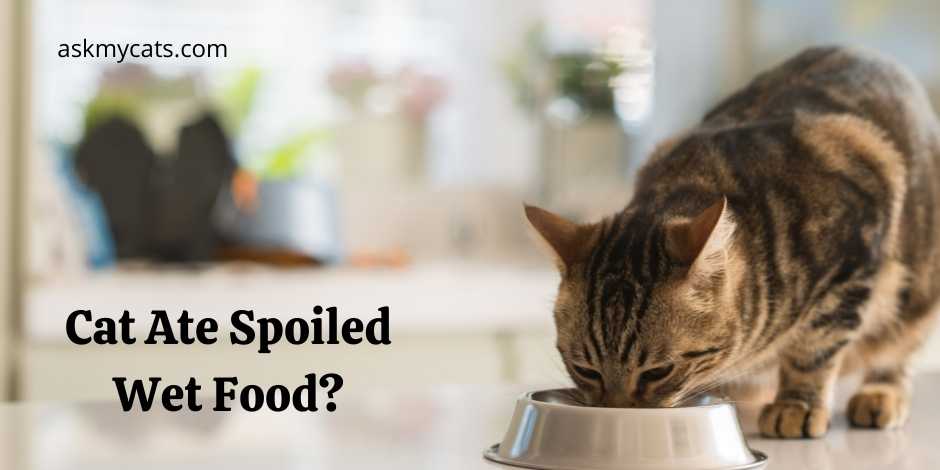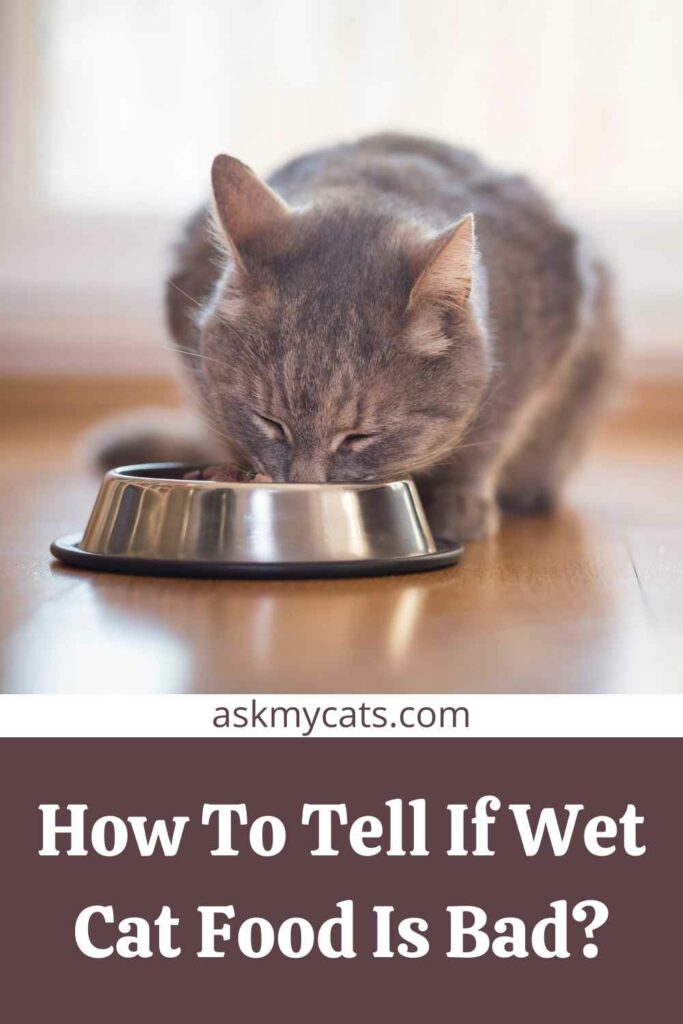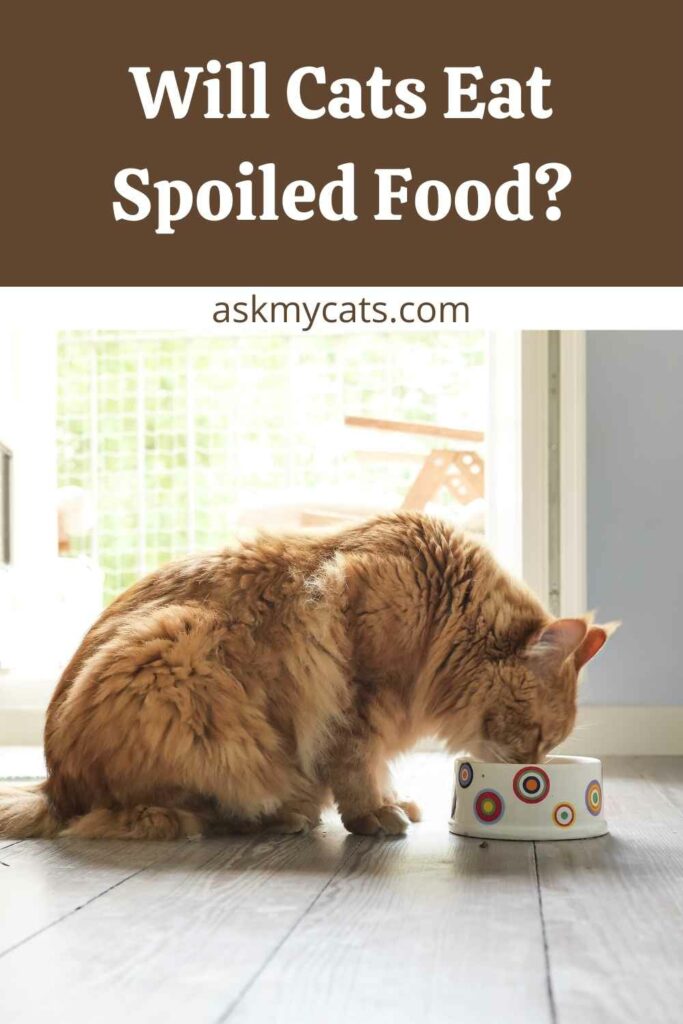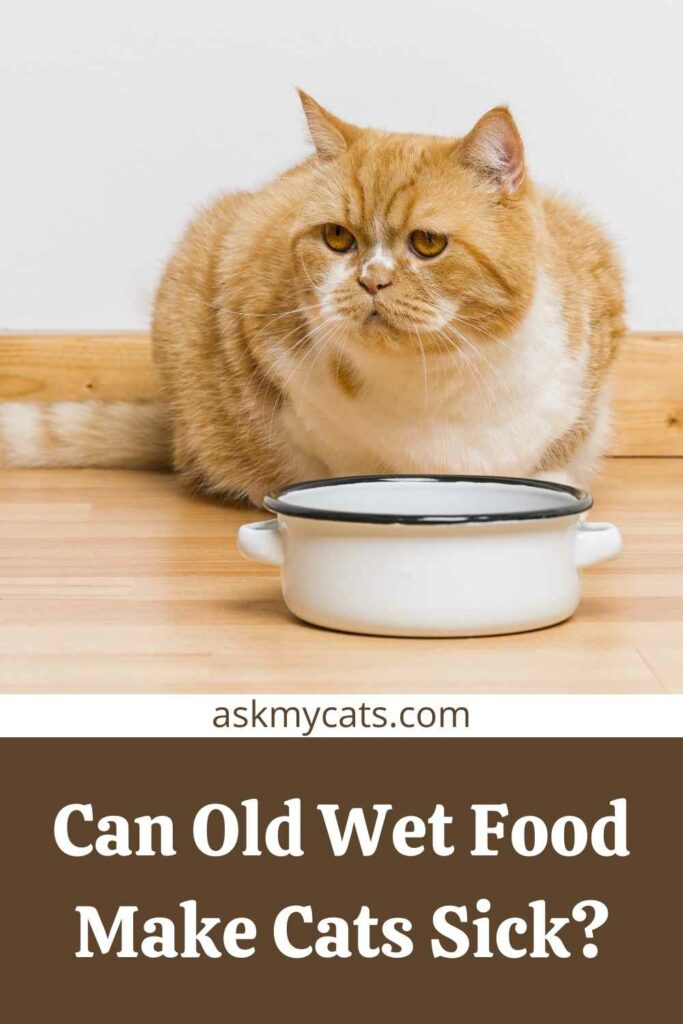Food always expires after a set period of time. That is why all foods, including eggs and vegetables, have a shelf life. Pet food has an expiration date as well, although canned cat food may rot far more quickly.
You must be cautious about what you feed your cats since they have no way of telling you if the food has gone rotten.
If your cat eats rotten wet food, it will become unwell rapidly, usually within one hour. Vomiting, tremors, agitation and hyperactivity, a high body temperature, and panting are all common symptoms. Convulsions may occur in extreme situations.
It’s not unusual to find spoiled canned cat food. Wet food, in fact, has a significantly shorter shelf life than dry kibbles.
Because dry food has no water, it is also easy to preserve; nevertheless, numerous care must be taken to prevent it from spoiling when it comes to canned food.


Give Your Cat the Perfect Day
Get the Free Ebook!
How To Tell If Wet Cat Food Is Bad?
There are a few ways to determine if your cat’s food has gone bad, but the most obvious indicator is when your cat refuses to eat it.

If your cat isn’t a picky eater but suddenly refuses to eat the food she enjoys, investigate more to see if there’s a problem with the food.
A significant foul or rotting odor, mould or insect development, if the food has been exposed to moisture or humidity, or if your pet displays indications of pain or sickness after consuming the food are some other ways to know.
You must not offer any canned cat food that has beyond its expiration date, regardless of whether it is spoilt.
Canned cat food has a shelf life determined by how it is stored. The best approach to guarantee that your pet’s canned food lasts until the expiration date is to store it in the original packing in a cool, dark, dry area.
If you leave wet food out for too long, it can spoil. There are a few factors to consider, such as how hot it is, how humid it is, and where it has been left for the most part.
As a general rule, wet food should not be kept out in cold temperatures for more than 8 hours.
Also, read about does wet cat food go bad if left out
However, if it’s a hot day, say 50 degrees Fahrenheit, don’t keep wet food out for more than four hours.
The amount of time food may be left out on a humid day or if it has grown moist is considerably reduced.
Since bacteria grow in moisture, wet food will become infected with bacteria faster than wet food. It’s not worth the danger of keeping wet food out; throw it out.
The most severe problem with old wet food is that it will spoil over time, especially if it is opened or not kept in an airtight container.
Wet food lasts longer than wet food because it is less vulnerable to microbial growth.
This is obviously a positive thing, as mould is far less likely to form in the absence of moisture.
However, it will wet up and lose most of its flavor and nutritional value, especially if it’s past its expiration date.
If it’s a little stale, it shouldn’t make your cat ill as though you were about to devour some meal that was beyond its prime.
You might also like to know about can canned cat food go bad in heat
Can Cats Tell If Food Is Spoiled?
Cats cannot tell if the food is spoiled but they can instinctively know when the food is unfit to eat.
Cats rely on their sense of smell to determine whether or not food has gone rotten, and they should be aware when anything has gone bad. If they don’t like what they’re sniffing, they’ll generally pull away from it and go away without eating it.
However, this isn’t an exact science, and cats are significantly less picky than humans regarding outdated meat. Before giving anything to a cat, exercise your best judgment.
You might also like to check out how long does wet cat food last
Will Cats Eat Spoiled Food?
Cats do not prefer to eat spoiled food.

When a cat consumes anything that doesn’t agree with them, the initial reaction is usually for them to vomit. When food is rotting, your cat is likely to have that reaction.
Vomiting from rotting food can linger for many days, and your cat may get dehydrated as a result. This will result in a costly vet bill to rehydrate your cat, so it’s better to avoid giving them bad food, to begin with.
Because of the germs and diseases that ruined or rotting food may cause, both people and animals are advised to avoid eating it, with E.coli being one of the most common forms of bacteria.
Since ground beef is the type of food most prone to transmit E. coli, be especially cautious while feeding it to your cat.
Botulism is an uncommon but potentially lethal disease caused by a toxin produced by a bacterium. Cats who consume roadkill or contaminated food are the most likely to develop this disease.
This particular kind of bacteria develops on food and can be passed on to your cat if it consumes it.
Botulism symptoms frequently appear within a few hours after eating infected food. The weakening in your cat’s back legs is the first sign, followed by weakness in the front legs and finally the face.
When found early enough, botulism may be treated, and the cat will be given an antitoxin. However, this is not a disease to take lightly, as it can lead to your cat’s hospitalization and make them more susceptible to subsequent infections.
Cats’ ability to fend off harmful diseases and illnesses deteriorates as they get older. You want to do everything you can to protect their health and prevent illness, including avoiding bad food.
Cats should not eat any rotting food since it contributes significantly to the spread of foodborne infections. After eating rotting food, your cat will most likely suffer and be in agony for at least several days since it can cause fever, cramps, diarrhea, and vomiting.
You might also like to read about do cat treats expire
Can Old Wet Food Make Cats Sick?
Yes, eating old wet food can make your cats seriously sick.

Even if your cat loves to consume their food in tiny portions, don’t keep wet food out all day because this raises the danger of disease-causing germs forming.
Throw away the old food after four hours and thoroughly clean the dish with soap and water before replacing it with fresh food.
Wet cat food is often sold in sachets or cans, which can be stored for a long time if not opened. However, as soon as you open a sachet or can, the food is exposed to air, as well as microorganisms.
Warmer months or placing your cat’s bowl in a warm area of the house might speed up the rate at which the food expires.
If your cat doesn’t finish an entire dish of wet food in one sitting, cover it and keep it refrigerated. When your cat becomes hungry again, reheat the food gently in the microwave, as most cats loathe cold food.
What Happens If My Cat Eats Spoiled Food?
Although cats’ stomach are stronger than people’s, it will most certainly upset their stomach if your cat eats spoiled food.
They are unable to interact with their owners, and as a result, they will most likely become unwell.
It usually takes a day or two for food poisoning or an unsettled stomach to pass. During this period, keep an eye on your cat to ensure they are getting enough water.
The term “botulism” refers to a poisonous substance. Botulism, a toxin generated by bacteria, may paralyze a person from the waist down. If you believe your cat has botulism, you should take him to a veterinarian as soon as possible.
Botulism is a type of food poisoning caused by bacteria that proliferate as food products such as meat or plants degrade.
Frequently Asked Questions
Does wet food for cats go bad?
Of course, you can’t determine a food’s quality only based on its smell—many pet meals, particularly wet cat feeds, have a strong odor. Although canned food is unlikely to decay after the “Best By” date, its shelf life is limited to a year from the time of manufacture.
How long before wet cat food goes bad?
Any uneaten pet food in an open can should be disposed of within three days of opening. If you often put opened cans of pet food in the refrigerator, write the date the can was opened using a marker right on the can. This will assist you in keeping track of when the opened can should be thrown away.
Do stray cats eat rotten food?
Even having their powerful GI tract, they are seen more often for food-related sickness than cats since cats are more fussy eaters and are less prone to ingest bad food. It still happens, though. Foodborne infections such as salmonella can infect cats.
Final Words
Wet cat food that hasn’t expired for more than a few months is typically safe for cats. While you should not eat expired food a day after it has expired, cats can tolerate a lot more food and digestion than humans can.
However, inspect the food for mould and germs before feeding it to your cat.
Drop your questions in the comments section below.
